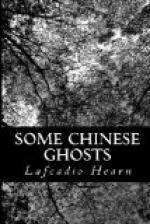That morning, on returning to the house of Lord Tchang, Ming-Y told the first falsehood which had ever passed his lips. He averred that his mother had requested him thenceforward to pass his nights at home, now that the weather had become so pleasant; for, though the way was somewhat long, he was strong and active, and needed both air and healthy exercise. Tchang believed all Ming-Y said, and offered no objection. Accordingly the lad found himself enabled to pass all his evenings at the house of the beautiful Sie. Each night they devoted to the same pleasures which had made their first acquaintance so charming: they sang and conversed by turns; they played at chess,—the learned game invented by Wu-Wang, which is an imitation of war; they composed pieces of eighty rhymes upon the flowers, the trees, the clouds, the streams, the birds, the bees. But in all accomplishments Sie far excelled her young sweetheart. Whenever they played at chess, it was always Ming-Y’s general, Ming-Y’s tsiang, who was surrounded and vanquished; when they composed verses, Sie’s poems were ever superior to his in harmony of word-coloring, in elegance of form, in classic loftiness of thought. And the themes they selected were always the most difficult,—those of the poets of the Thang dynasty; the songs they sang were also the songs of five hundred years before,—the songs of Youen-tchin, of Thou-mou, of Kao-pien above all, high poet and ruler of the province of Sze-tchouen.
So the summer waxed and waned upon their love, and the luminous autumn came, with its vapors of phantom gold, its shadows of magical purple.
* * * * *
Then it unexpectedly happened that the father of Ming-Y, meeting his son’s employer at Tching-tou, was asked by him: “Why must your boy continue to travel every evening to the city, now that the winter is approaching? The way is long, and when he returns in the morning he looks fordone with weariness. Why not permit him to slumber in my house during the season of snow?” And the father of Ming-Y, greatly astonished, responded: “Sir, my son has not visited the city, nor has he been to our house all this summer. I fear that he must have acquired wicked habits, and that he passes his nights in evil company,—perhaps in gaming, or in drinking with the women of the flower-boats.” But the High Commissioner returned: “Nay! that is not to be thought of. I have never found any evil in the boy, and there are no taverns nor flower-boats nor any places of dissipation in our neighborhood. No doubt Ming-Y has found some amiable youth of his own age with whom to spend his evenings, and only told me an untruth for fear that I would not otherwise permit him to leave my residence. I beg that you will say nothing to him until I shall have sought to discover this mystery; and this very evening I shall send my servant to follow after him, and to watch whither he goes.”




